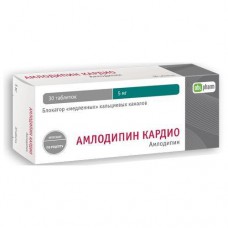Expiration date: 02/2026
Pharmacological action
Amlodipine is a class II selective calcium channel blocker. The antihypertensive effect is due to the direct relaxing effect on the smooth muscles of the vessels. It is assumed that the antianginal effect of amlodipine is associated with its ability to expand peripheral arterioles; this leads to a decrease in OPSS, reflex tachycardia does not occur. As a result, there is a decrease in myocardial oxygen demand and energy consumption of the heart muscle. On the other hand, amlodipine appears to cause dilation of large caliber coronary arteries and coronary arterioles in both intact and ischemic myocardial areas. This ensures the flow of oxygen to the myocardium in spasms of the coronary arteries.
Indications
Arterial hypertension (including combination therapy), stable angina, unstable angina (including Prinzmetal's angina).
Contraindications
Severe hypotension. Increased sensitivity to dihydropyridine derivatives.
Use during pregnancy and breast-feeding
The safety of Amlodipine during pregnancy and lactation is not established. Application is possible only in cases where the intended benefit to the mother exceeds the potential risk to the fetus or child.
Special instruction
Amlodipine is used with caution in violations of liver function, with stenosis of the aortic mouth, with chronic heart failure. Patients with impaired renal function, as well as elderly patients do not need to reduce the dose. It is possible to use amlodipine for the treatment of patients with dilated (non-ischemic) cardiomyopathy, accompanied by a severe form of chronic heart failure.
Clinical data on the use of amlodipine in children are absent.
Composition
1 tablet contains amlodipine (in the form of bezilata) 5 or10 mg.
Dosage and administration
For adults, when administered the initial dose is 5 mg 1 time / day. If necessary, the dose can be increased.
The maximum dose: ingestion-10 mg / day.
Side effect
From the cardiovascular system: possible peripheral edema, heartbeat, hyperemia of the skin; when used in high doses - hypotension, arrhythmia, shortness of breath.
From the digestive system: nausea, abdominal pain; rarely-hyperplasia of the gums.
From the Central nervous system: possible headache, fatigue, drowsiness, dizziness.
Allergic reactions: skin rash, itching.
Drug interaction
While the use of Amlodipine with other antihypertensive drugs may increase hypotensive action; with funds for inhalation anesthesia - may increase hypotensive action; with drugs lithium-possible manifestations of neurotoxicity, including nausea, vomiting, diarrhea, ataxia, tremor and/or tinnitus; with sympathomimetics - may reduce hypotensive action. Indomethacin and other NSAIDs may reduce the hypotensive effect of amlodipine, inhibiting the synthesis of prostaglandins in the kidneys and / or causing fluid retention.
Storage conditions
Store in a dry place at a temperature not exceeding 25°C, in places inaccessible to children.


